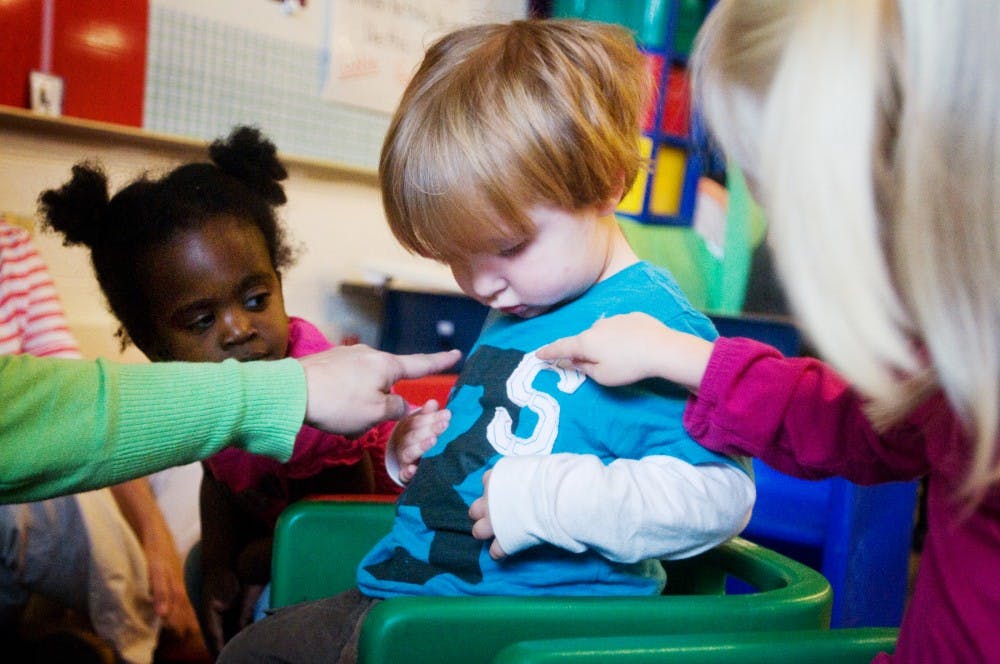This story is part of a series on Charlie and the Wallers.
Three-year-old Charlie Waller’s face broke into a grin as he listened to his teacher read a story about a hairy monster family during class Thursday.

This story is part of a series on Charlie and the Wallers.
Three-year-old Charlie Waller’s face broke into a grin as he listened to his teacher read a story about a hairy monster family during class Thursday.
He squirmed with excitement as his teacher asked him about his family — his father John, mother Abigail and sister Esther Waller.
“Mommy, Dad and Esty,” Charlie said as he held up four fingers to represent all the members of his family.
School is different for Charlie. It isn’t so much about learning to count and naming the colors of the rainbow, and it wouldn’t matter if he never learned the days of the week, Abigail said.
“All I really care about is if he’s happy and has confidence,” Abigail said. “I don’t care if he learns his ABCs.”
Charlie, who was diagnosed with a rare and inoperable brainstem cancer in early April, began school at the Pinecrest Elementary School, 1811 Pinecrest Drive, special education program this fall.
Children with diffuse intrinsic pontine glioma, or DIPG, typically live up to two years after their diagnosis.
His struggle to communicate, coupled with random tantrums — which might be caused by the trauma of radiation therapy or the tumor pressing against his brain — influenced his parents to place him in a special education program where teachers would be better prepared to help him, Abigail said.
Every morning, John and Abigail plead with their son and try to convince him to go to class. Whether Charlie feels normal separation anxiety or discomfort because of the disease is unclear — as a young child, it’s difficult for him to express himself, his parents said.
Still, on his first day of class, Charlie strutted proudly around with his backpack. After months of watching with envy as 7-year-old Esther boarded the school bus each morning, he was excited to begin, Abigail said.
“I could very easily keep him in my arms and hold him tight and not let him experience things because I am scared of the future,” she said. “(But) we’ve been told within the next year that he won’t be able to have that experience.”
Between the doctor visits, the weight he gained and lost from ingesting steroids and his experimentation with a special diet to combat the cancer, Charlie has felt self-conscious and restricted, John said.
“He’s acutely embarrassed by it because he feels like he’s being left behind by his peers,” John said.
Surrounded by children dealing with medical or cognitive challenges and teachers trained to be adaptable to student needs, Charlie’s parents hope the classroom will establish a new sense of normal for him.
Although he faces his own challenges, Charlie has scored as well as 6 year olds in intelligence tests, Abigail said.
When other children are struggling, Charlie will reach out a hand and physically guide them in the right direction, his teacher Victoria Hall said.
“Young kids who experience various illnesses can sometimes feel very passive in the face of medical intervention and hospitalization,” MSU pediatric psychologist Judy Brady said. “Having an opportunity not only to be cared for, but to care and help others puts him in a more proactive role.”
Despite a few tears at the beginning of some classes, Charlie usually returns home with a smile on his face, John said.
Although he misses his mother, father and sister, he’s happy to spend a few hours each day decorating paper turkeys, playing with action figures and trying to count all of his fingers, Abigail said.
Support student media! Please consider donating to The State News and help fund the future of journalism.
On the first day, he turned to her and said, “Mummy, I’m okay now. Me be by myself now. You okay, Mum.”